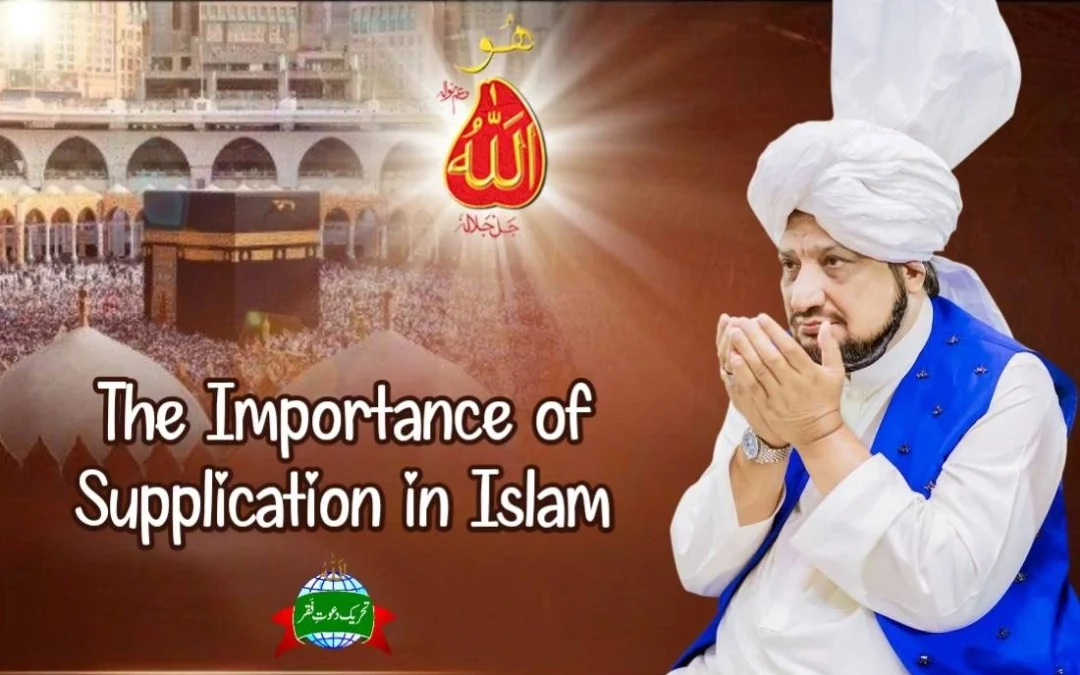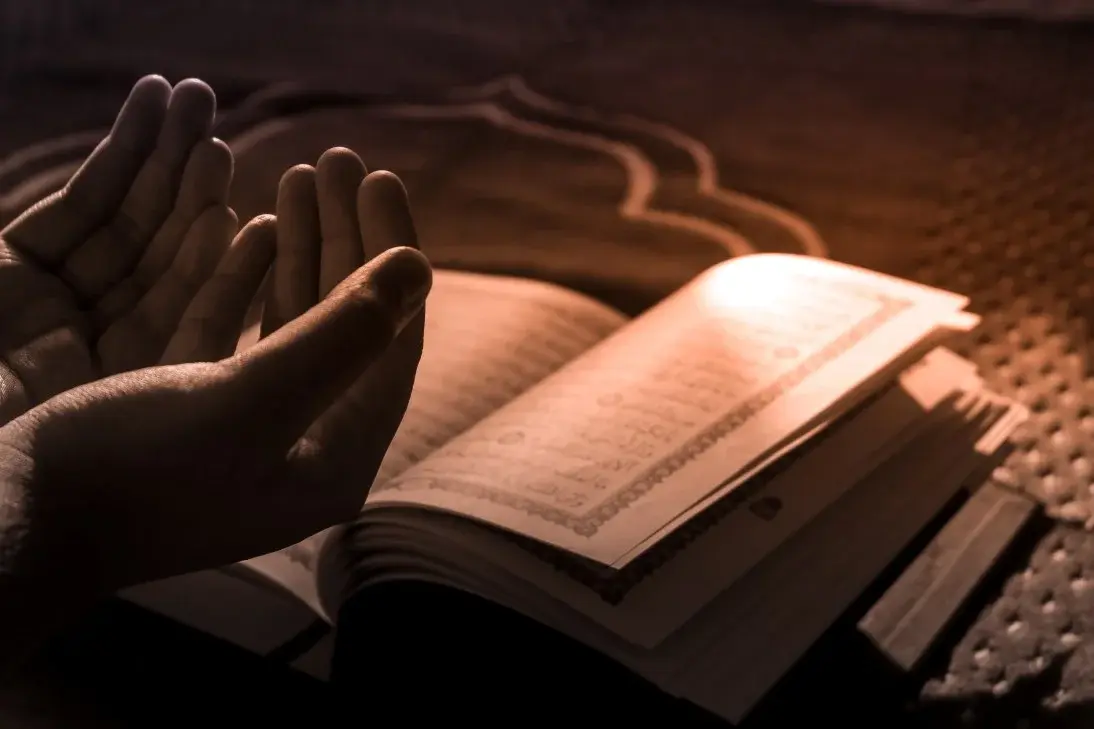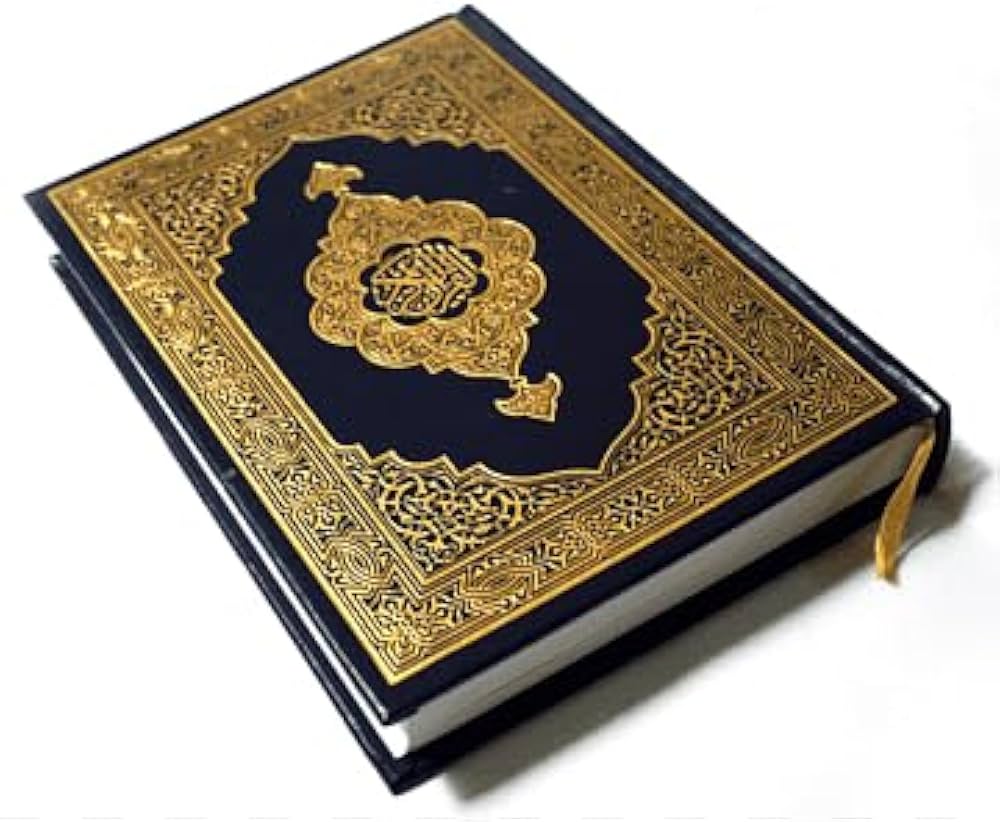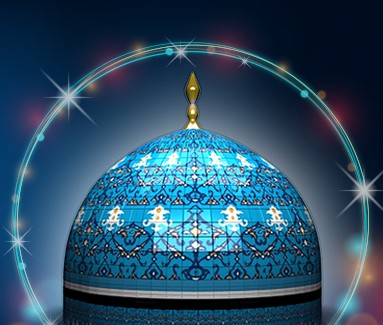Importance of Supplication in Islam
Supplication (dua) holds a deeply significant and revered place in Islam. It is more than just a plea for help, it represents worship, humility, devotion, and trust in Allah. The Quran and Hadiths emphasises the importance of dua, portraying it as a direct, personal communication between the man and Allah. Allah commands believers to call upon Him, promising to respond to their supplications. Verses such as Surah Al-Ghafir (40:60) and Surah Al-Baqarah (2:186) highlight the nearness of Allah to those who invoke Him and affirm His readiness to grant their requests.
Dua is not only a spiritual act but also as a symbol of submission and dependence on Allah’s mercy. It is through dua that a believer expresses neediness, detachment from worldly reliance, and a desire to strengthen their bond with Allah. Prophet Mohammad (pbuh) emphasised the elevated status of dua, stating that it is the essence of worship and the most noble act in Allah’s sight. He encouraged Muslims to pray consistently, even in matters as small as the strap of a sandal.
Prominent Islamic scholars have also elaborated on the role of dua. Imam Ibn Hajar quotes Allama Tayyibi, defining dua as a deep expression of humility before Allah. In the Sufi tradition, as mentioned in Al-Risalah al-Qushayriyyah, dua is seen as a spiritual dialogue marked by modesty, longing, and abandonment of sin. Shaikh Abdul Qadir Jilani (RA) strongly advises believers never to give up on supplication, regardless of their circumstances, as dua either leads to the fulfilment of needs or brings contentment and reward in this life or the Hereafter.
Imam Mubarakpuri describes dua as an essential expression of servitude and disassociation from all power except Allah’s. He notes that even the Holy Prophet always prayed for his umma and not for himself. Dua is not only a spiritual need but also a practical means of seeking relief from hardship, sorrow, or illness, as well as a tool to attain Allah’s mercy and forgiveness.
However, conditions for the acceptance of dua include sincerity, halal sustenance, and a conscious, focused inward. A dua made with inattentiveness or while engaging in unlawful acts is not be accepted. Allah criticises those who remember Him only in hardship and forget Him in ease, as noted in Surah Yunus (10:12) and Surah Az-Zumar (39:8).
Ultimately, dua serves as a powerful connector between the believer and Allah, fostering spiritual closeness, reinforcing reliance on Him, and acting as a channel of grace in both worldly and eternal matters. It is a manifestation of faith, a refuge in times of need, and a cherished form of worship beloved to Allah.
The Importance of Supplication in Islam
Dua (supplication) is an Arabic word whose literal meaning is to call, worship and seek help. However, in terminological sense, it refers to asking help from Allah.
Allah says in Quran:
وَ قَالَ رَبُّكُمُ ادْعُوْنِیْۤ اَسْتَجِبْ لَكُمْ ؕ
And your Lord has said: ‘Always pray to Me; I shall certainly grant your prayer. (40: 60)
In this verse the word ادْعُوْنِیْۤ refers to supplication.
Prayer is a great supplication. There are many Quranic verses and Hadiths in this regard. One of the wisdoms in supplication is that it is our expression of love for Allah, the symbol of our devotion to Him, a symbol of our servitude before His Divine majesty, a declaration of our trust and reliance upon His knowledge, power, and generosity and a testimony and affirmation of our faith in Him.
Dua encompasses such immense mercy, blessings, virtues, and benefits that there is hardly any religion in the world which does not encourage it. Asking through dua is a way of expressing one’s servitude, humility, helplessness, neediness, and utter dependence before Allah. It is an open declaration that the one who prays considers himself in need of Allah’s grace and mercy.
Importance of Supplication in Quran
In the Holy Quran, Allah has encouraged and advised us to make dua in various ways and has also promised to accept it.
Allah says:
وَ اِذَا سَاَلَكَ عِبَادِیْ عَنِّیْ فَاِنِّیْ قَرِیْبٌ ؕ اُجِیْبُ دَعْوَةَ الدَّاعِ اِذَا دَعَانِ ۙ فَلْیَسْتَجِیْبُوْا لِیْ وَ لْیُؤْمِنُوْا بِیْ لَعَلَّهُمْ یَرْشُدُوْنَ
And, (O Beloved,) when My servants ask you about Me, tell them I am near. I reply the call of the supplicant whenever he calls Me out. So, they should embrace My obedience and have (firm) faith in Me so that they may find the (coveted) road (leading straight to the destination). (2: 186)
اَمَّنْ یُّجِیْبُ الْمُضْطَرَّ اِذَا دَعَاهُ وَ یَكْشِفُ السُّوْٓءَ وَ یَجْعَلُكُمْ خُلَفَآءَ الْاَرْضِ ؕ ءَاِلٰهٌ مَّعَ اللّٰهِ ؕ قَلِیْلًا مَّا تَذَكَّرُوْنَؕ
Or, Who grants the supplication of the anxiety-stricken caller when he calls upon Him, and Who removes the trouble and makes you successors and inheritors (of the predecessors) in the earth? Is there any (other) God besides Allah? You people accept advice but little. (27: 62)
Abu Huraira (RA) narrated that the Holy Prophet (pbuh) said:
“Nothing is more honourable and noble in the sight of Allah than supplication (dua).”
(Jami al-Tirmidhi, Hadith 3370)
Numan bin Bashir (RA) narrates that the Holy Prophet (pbuh) said:
“Dua is worship.”
(Jami al-Tirmidhi, Hadith 3247)
The Holy Prophet further said:
“Ask Allah for His bounty, for Allah loves to be asked and the best form of worship is to wait for relief (ease or prosperity) through supplication.” (Jami al-Tirmidhi, Hadith 3571)
Hadiths about Importance of Supplication
Salman al-Farsi (RA) reports that the Messenger of Allah (pbuh) said:
“Nothing changes destiny except dua, and nothing increases life except righteousness.”
(Jami al-Tirmidhi, Hadith 2139)
While clarifying the concept of dua, Imam Ibn Hajar al-Asqalani quotes the words of Allama Tayyibi in Fath al-Bari:
“Dua is the expression of utmost humility, neediness, and submissiveness before Allah.”
In Al-Risalah al-Qushayriyyah, it is stated that according to the Sufis:
- Dua is coming before Allah with the language of modesty.
- Dua is the abandonment of sins.
- Dua is an expression of longing to meet Allah.
- Dua is a form of mutual communication with Allah. As long as this connection is maintained, the relationship remains intact.
Imam Qushayri, quoting Sahl bin Abdullah, writes:
“After creating the creation, Allah said: ‘Speak to Me.’ If you are unable to do that, then ‘Look towards Me.’ If you cannot do that, then ‘Listen to My words.’ If you cannot do that either, then ‘Stay at My door.’ And if even that is not possible, then ‘Bring your needs to Me.” (Al-Risalah al-Qushayriyyah)
Shaikh Abdul Qadir Jilani about Supplication
Ghaus al-Azam Shaikh Abdul Qadir Jilani (RA), states in Futuh al-Ghaib:
O believer! Do not say, “I will not make dua (supplication) to Allah, because whatever is written in my destiny, I will receive it whether I ask for it or not.” Rather, O servant! Ask Allah for everything you need in this world and the Hereafter, as long as it is not something forbidden or a cause of corruption. Do not say, “I ask from Him but my request is not accepted, so I will stop asking.” O servant of Allah! Keep asking your Lord continuously. If the thing you are asking for is in your destiny, it will be granted to you after your dua. At that time, this granting will strengthen your belief in Divine oneness, create detachment from the creation, and in every condition turn towards Allah. It will become a means of fulfilling your needs and increase your faith and certainty.
If that thing is not written in your destiny, then Allah will grant you independence from it and bestow upon you the great gift of contentment in a state of need. If you are suffering from poverty or illness, He will make you content with it. And if you are in debt, He will incline the creditor towards leniency, delay until ease, forgiveness, or reduction. Yes, it is also possible that if the debt is not repaid in this world, then a great reward will be given in the Hereafter. For, Allah is Generous, Self-Sufficient, and Merciful. He does not leave His supplicating servant disappointed. The benefit will certainly reach the person, whether in this world or the Hereafter. (Futuh al-Ghaib)
Imam Mubarakpuri says about Supplication
Imam Mubarakpuri states:
Dua refers to the act of a lowly creation asking the Supreme Being for something through words, in a manner that expresses humility and helplessness.
Dua is a symbol of servitude. Through it, a servant seeks the attention of Allah, and obtains His help and mercy. Through dua, one presents their needs and expresses their helplessness. It is also a declaration of disassociation from the power and strength of anyone other than Allah. Thus, we find dua at the beginning of the Quran as well as at its end. In Surah Al-Fatiha, the servant presents a request to Allah alongside His praise. Similarly, in the last two Surahs, the servant seeks refuge in Allah.
Whenever the Holy Prophet made dua, he always prayed for his umma. He never asked for anything for himself. Every moment, he remained concerned for his umma and constantly prayed in the court of Allah for his Companions and his entire umma.
Dua Brings a Person Close to Allah
Dua is a means for fulfilling both worldly and spiritual needs. It is one of the greatest ways to eliminate sorrow and hardship. Dua is a means of completing servitude and devotion. It strengthens the bond between the man and Allah. It increases the desire and motivation for sincerity in one’s actions. Dua reminds the servant of Allah’s power and of their own humility. It is a bridge between the Creator and the creation, directly connecting the servant to their Lord.
Dua is beloved to Allah. Even if a person does not express gratitude to the Almighty in times of happiness, they do not forget their Lord during moments of pain, distress and grief. From the depths of their heart, a cry of need arises, and their hands are instinctively raised in supplication. With humility and deep reverence, they bow before Allah in prayer. In a state of desperation and helplessness, their lips begin to move, and they cry out to their Lord in deep humility and need.
At that moment, the person feels so close to Allah that asking again and again does not feel burdensome. Instead, it becomes a source of sweetness and delight. For a believer, it is essential to raise their hands in prayer to Allah in both ease and difficulty. Dua is the expression of a heart’s yearning. Dua is when a person has an intense desire for something, devotes their entire being to it, and then asks for it from Allah.
One Must Remember Allah in Good and Difficult times
There are some people who remember Allah only during times of hardship and distress, and raise their hands in supplication to Him. But when the hardship is lifted, they abandon prayer. This behaviour is disliked by Allah.
The Almighty says:
وَ اِذَا مَسَّ الْاِنْسَانَ الضُّرُّ دَعَانَا لِجَنْۢبِهٖۤ اَوْ قَاعِدًا اَوْ قَآىِٕمًا ۚ فَلَمَّا كَشَفْنَا عَنْهُ ضُرَّهٗ مَرَّ كَاَنْ لَّمْ یَدْعُنَاۤ اِلٰی ضُرٍّ مَّسَّهٗ ؕ كَذٰلِكَ زُیِّنَ لِلْمُسْرِفِیْنَ مَا كَانُوْا یَعْمَلُوْنَ
And when a misery touches (such a) man, he calls out to Us whilst lying on his side or sitting or standing. But when We remove from him his affliction, he passes on (forgetting Us) as if he (never) called out to Us in the pain that had touched him. This is how the (wrong) deeds which the transgressors do are made to appear to them fascinating. (10: 12)
In Surah Az-Zumar, this negative trait of human beings is further described:
وَ اِذَا مَسَّ الْاِنْسَانَ ضُرٌّ دَعَا رَبَّهٗ مُنِیْبًا اِلَیْهِ ثُمَّ اِذَا خَوَّلَهٗ نِعْمَةً مِّنْهُ نَسِیَ مَا كَانَ یَدْعُوْۤا اِلَیْهِ مِنْ قَبْلُ وَ جَعَلَ لِلّٰهِ اَنْدَادًا لِّیُضِلَّ عَنْ سَبِیْلِهٖ ؕ قُلْ تَمَتَّعْ بِكُفْرِكَ قَلِیْلًا ۖۗ اِنَّكَ مِنْ اَصْحٰبِ النَّارِ
And when some suffering afflicts man, he turns to his Lord and cries out. Then when (Allah) grants him some blessing from Himself, he forgets that (suffering) which he used to beseech relief from. (39: 8)
In dua, a person presents their difficulties before Allah, who knows the secrets of every heart. This act brings mental peace and eases the burden from the heart. Prophet Mohammad (pbuh) taught that even for the smallest of needs, one should knock on the door of Allah.
Dua is a means of forgiveness and mercy
Abu Hurairah narrated that the Holy Prophet said:
“Ask Allah for whatever you need, even if it is the strap of your sandal, for if He does not will its provision, it will not be granted.” (Bayhaqi, Shu’ab al-Iman)
Dua is a means for forgiveness and mercy. It supports us moment by moment throughout our lives, and it will also be a cause of our elevation in the life of the Barzakh (the life after death, before the Day of Judgment).
Imam Muslim narrates from Aseer bin Jaber regarding the supplication for forgiveness made by Uwais al-Qarni (RA):
Whenever a delegation from Yemen came to Umar ibn al-Khattab (RA), he would ask, “Is there anyone among you named Uwais bin Aamir?” One day, Uwais al-Qarni came. Umar (RA) asked, “Are you Uwais bin Aamir?” He replied, “Yes.” Umar asked, “Are you from the tribe of Murad?” He said, “Yes.” “And are you from Qarn?” He said, “Yes.” Then Umar asked, “Did you suffer from leprosy and recover from it except for a spot the size of a dirham?” He replied, “Yes.” Then Umar (RA) said:
“I heard the Messenger of Allah (pbuh) say: A man named Uwais bin Aamir will come to you with the people of Yemen from the tribe of Murad and the clan of Qarn. He had leprosy, but Allah healed him except for a patch the size of a dirham. He has a mother whom he treats with great kindness. If he were to swear by Allah about something, Allah would fulfil it. If you can, ask him to pray for your forgiveness.
Umar then requested: “Please ask forgiveness for me.” So, Uwais al-Qarni prayed for his forgiveness. (Sahih Muslim, 6492)
Conditions for Supplication (Dua)
Sincerity in making dua
The foremost condition for the acceptance of dua is that it should be made with complete faith and sincerity. Just as sincerity is essential in other acts of worship, it is equally necessary for the acceptance of dua.
Allah Almighty says:
وَ مَاۤ اُمِرُوْۤا اِلَّا لِیَعْبُدُوا اللّٰهَ مُخْلِصِیْنَ لَهُ الدِّیْنَ ۙ۬ حُنَفَآءَ وَ یُقِیْمُوا الصَّلٰوةَ وَ یُؤْتُوا الزَّكٰوةَ وَ ذٰلِكَ دِیْنُ الْقَیِّمَةِؕ
Whereas they were commanded to worship only Allah, making their Din (faith and devotion) sincerely His (dissociating from every falsehood) to establish Prayer and to pay Zakat (the Alms-due) regularly. And this is the straight and firm Din (Religion). (98: 5)
Abu Hurairah narrates that the Messenger of Allah said:
“Ask Allah with certainty of acceptance, and know that Allah does not respond to a supplication from a negligent and heedless inward.”
(Jami’ al-Tirmidhi, 3479)
Halal sustenance
Halal sustenance is a condition for the acceptance of dua.
Allah Almighty says:
كُلُوْا مِنْ طَیِّبٰتِ مَا رَزَقْنٰكُمْ وَ لَا تَطْغَوْا فِیْهِ فَیَحِلَّ عَلَیْكُمْ غَضَبِیْ ۚ وَ مَنْ یَّحْلِلْ عَلَیْهِ غَضَبِیْ فَقَدْ هَوٰی
(And He said to you:) ‘Eat of the pure things that We have provided for you, and do not exceed limits in that, or My wrath will become inevitable for you. And he on whom My wrath comes due is in truth destroyed.’ (20: 81)
Abu Hurairah reported that the Messenger of Allah said:
O people! Allah is Pure and accepts only that which is pure. And He has commanded the believers with what He commanded the messengers. Allah Almighty said, O Messengers, eat from the good things and do righteous deeds. Indeed, I am aware of what you do. And He said, O believers! Eat of the good things We have provided for you.
Then the Holy Prophet mentioned a man who, after a long journey, with dishevelled hair and dusty clothes, raises his hands to the sky and supplicates: O my Lord! O my Lord! – while his food is haram, his drink is haram, his clothing is haram, and he is nourished with haram. So, how can his supplication be accepted? (Sahih Muslim, 2346)
This hadith clearly indicates that unless a person’s food and drink are halal, their supplication is not accepted.
Acceptance of Supplication
One of the main reasons for supplications being rejected is the heedlessness of the inward and the darkness caused by sins. Before making a dua, it is essential to seek forgiveness in the court of Allah, confess one’s sins, and make a firm intention not to commit those sins again. This is a necessary condition for the acceptance of supplication.
Allah Almighty says:
وَ اٰخَرُوْنَ اعْتَرَفُوْا بِذُنُوْبِهِمْ خَلَطُوْا عَمَلًا صَالِحًا وَّ اٰخَرَ سَیِّئًا ؕ عَسَی اللّٰهُ اَنْ یَّتُوْبَ عَلَیْهِمْ ؕ اِنَّ اللّٰهَ غَفُوْرٌ رَّحِیْمٌ
And there are others (who) have confessed their sins. They have mixed up good deeds with some bad ones (by mistake). Allah will, most likely, accept their repentance. Surely, Allah is Most Forgiving, Ever-Merciful. (9: 102)
When one adheres to these conditions and makes dua, it is accepted. However, keep in mind that the true meaning of a dua being accepted is that Allah responds to His servant with لَبَّیْکَ عَبْدِیْ (I am here for you, My servant). It is not necessary that the exact thing asked for is granted. Rather, the response to the supplication may take various forms, for example:
- The person’s sins may be forgiven,
- A reward may be stored for them in the Hereafter,
- Something better may be given in place of what was requested,
- Or the fulfilment of the request may be delayed until a time of greater need.
Therefore, after making a dua, one should leave the outcome to Allah, the Most Merciful, knowing that He will choose what is best for us.
Types of Supplications
Haji Imdadullah Muhajir Makki says that there are four types of supplications:
- Obligatory Dua – For example, when a Prophet is commanded to pray for the destruction of his umma, then making that dua becomes obligatory.
- Wajib Dua – Like the Dua-e-Qunoot.
- Sunnah Dua – Such as the supplications recited after Tashahhud and other established prophetic prayers.
- Worshipful Dua – As done by the Mystics in which the act of worship itself is the aim. This type of dua is performed purely as an act of devotion because it involves humility and submission, which is beloved to Allah.
Maulana Ashraf Ali Thanwi writes in Muhimmat al-Dua:
“As long as the heart is not fully present during the dua, and the signs of humility and meekness are not evident, such a supplication cannot truly be considered a dua. This is because Allah looks at the state of the inward.” (Muhimmat al-Dua)
Importance of Connecting to a Perfect Spiritual Guide
“The state of the inward (heart) changes only through the company and spiritual guidance of a Perfect and accomplished Spiritual Guide. In the present age, it is only through the spiritual company of the accomplished Spiritual Guide, Sultan-ul-Ashiqeen Sultan Mohammad Najib-ur-Rehman that one attains presence of the inward (huzoor-e-qalb), which becomes a means of acceptance of supplication. He has never asked for anything other than the pleasure of Allah, and always prays the same for his disciples.”
“We pray that Allah Almighty makes us true and steadfast Momins in the real sense. May Allah grant us the ability to understand the importance of supplication, and make us among those who ask Him frequently and abundantly. Ameen.”
Books Consulted
- Futuh al-Ghaib by Ghaus al-Azam Shaikh Abdul Qadir Jilani
- Al-Risala al-Qushayriyya by Abul Qasim Abdul Karim bin Hawazin
- Dua aur Aadaab-e-Dua by Dr. Tahir-ul-Qadri
Note:
This is an English translation of Urdu blog دعا کی اہمیت that appeared in the May 2025 issue of monthly Sultan-ul-Faqr Magazine. Mrs Noreen Sarwari Qadri authored the original article. Zahid Anjum Siddiqui has translated it in English.
Question:
Why is supplication important in Islam?
Dua is a symbol of servitude. Through it, a servant seeks the attention of Allah, and obtains His help and mercy. Through dua, one presents their needs and expresses their helplessness. It is also a declaration of disassociation from the power and strength of anyone other than Allah. Thus, we find dua at the beginning of the Quran as well as at its end. In Surah Al-Fatiha, the servant presents a request to Allah alongside His praise. Similarly, in the last two Surahs, the servant seeks refuge in Allah.
Dua is beloved to Allah. Even if a person does not express gratitude to the Almighty in times of happiness, they do not forget their Lord during moments of pain, distress and grief. From the depths of their heart, a cry of need arises, and their hands are instinctively raised in supplication. With humility and deep reverence, they bow before Allah in prayer. In a state of desperation and helplessness, their lips begin to move, and they cry out to their Lord in deep humility and need.





Very nice. Good to learn about the importance of dua
Impressive ❤️
Very Beautiful ❤️ and Informative Article
Superb blog👍🏻
Dua is a symbol of servitude.
Supplication (dua) holds a deeply significant and revered place in Islam. It is more than just a plea for help, it represents worship, humility, devotion, and trust in Allah.
nice artcle
Blog 👌
Touches the heart with every word.
“Importance of Supplication in Islam” a good article
Yes we should ask Allah for help and have patience as well
Great blog ❤️
Dua is beloved to Allah. Even if a person does not express gratitude to the Almighty in times of happiness, they do not forget their Lord during moments of pain, distress and grief.
Nice
May Allah grant us the ability to understand the importance of supplication, and make us among those who ask Him frequently and abundantly. Ameen.
Haq